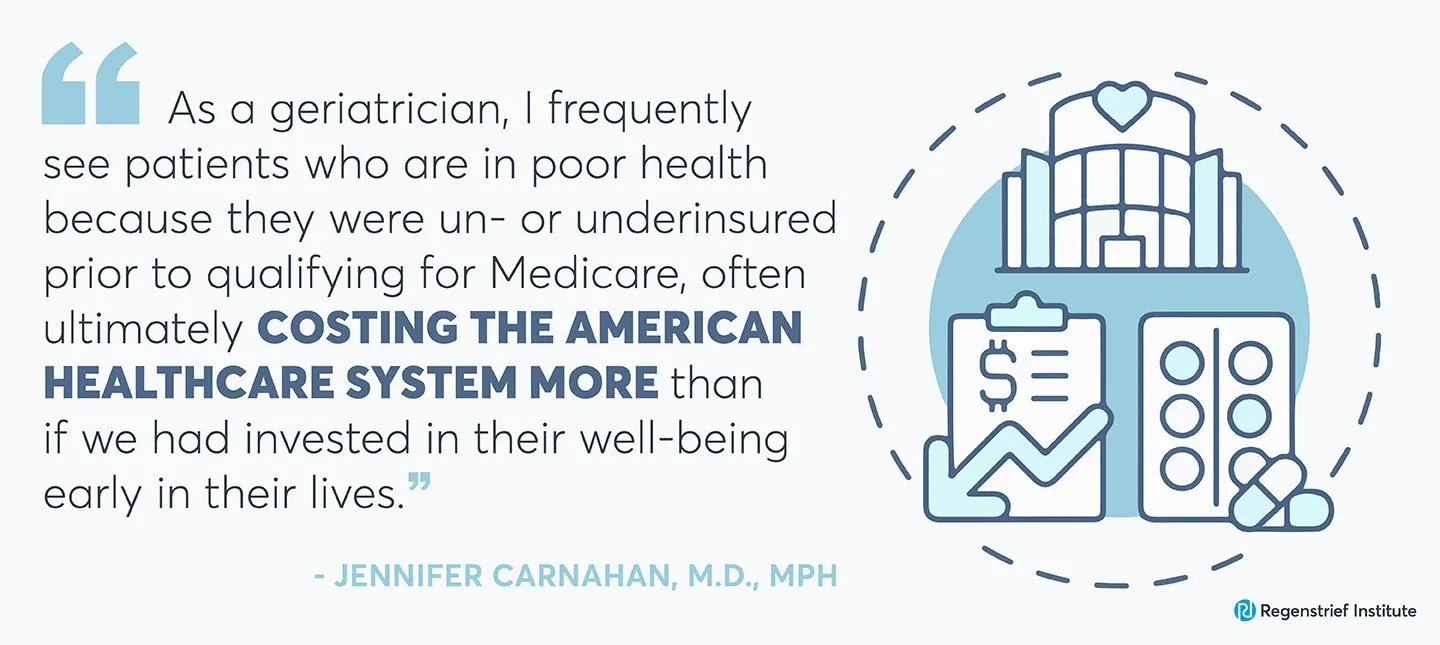Writing on behalf of the Society of General Internal Medicine’s Health Policy Research Committee, Regenstrief Institute Research Scientist and Indiana University School of Medicine faculty member Jennifer Carnahan, M.D., MPH, and colleagues from the universities of Texas and Toronto, Tufts University, Harvard T. H. Chan School of Public Health, Mayo Clinic and Brigham and Women’s Hospital highlight issues raised in the universal U.S. health coverage debate. They advocate strongly for rigorous and objective research on existing coverage systems paired with a robust national conversation that involves all stakeholder constituencies. They are optimistic that high-performing universal health insurance can be achieved.
The health policy experts reviewed available evidence concerning the impact of universal insurance coverage on three key domains: health outcomes, cost and equity.
They write that a “majority of Americans favor universal health insurance, but there is uncertainty over how best to achieve this goal. Whatever the insurance design that is implemented, additional details that must be considered include breadth of services covered, restrictions and limits on volume of services, cost-sharing for individuals, and pricing. In the hopes that research can inform this ongoing debate, we review evidence supporting different models for achieving universal coverage in the U.S. and identify areas where additional research and stakeholder input is needed.”
The health policy experts pinpoint critical areas for research:
- How should insurance coverage be provided and organized?
- How should the U.S. lower costs?
- What should universal insurance in the U.S. include and cover and how are those decisions to be made?
“Healthcare costs are the number one cause of bankruptcy in the U.S.,” said Dr. Carnahan, who, in addition to her role at Regenstrief, is an assistant research professor with Indiana University School of Medicine. “While we spend more per capita on healthcare than any other developed country, we do not provide the best care. We need a culture shift in the way we think about our nation and how we want to care for each other to correct the problem.
“As a geriatrician, I frequently see patients who are in poor health because they were un- or underinsured prior to qualifying for Medicare, often ultimately costing the American healthcare system more than if we had invested in their well-being early in their lives,” she said. “As a researcher, I am eager to find ways in which the nation can make an upfront investment in healthier lives from birth forward that will optimistically end up costing our healthcare system less. Or we may have to accept that good healthcare costs money. It’s going to be a hard battle to fight, but we need to do it.”
The SGIM health policy committee members evaluated various national healthcare insurance models, concluding that while none of these approaches would work for the U.S., each presented elements that might be applicable to the goal of making high-performing healthcare more accessible to individuals across the U.S.
“Getting to 100%: Research Priorities and Unanswered Questions to Inform the US Debate on Universal Health Insurance Coverage” is published in the Journal of General Internal Medicine and has been approved as an official statement of the Society of General Internal Medicine. In addition to Dr. Carnahan, the paper was written by Peter Cram, M.D., MBA of the universities of Texas and Toronto; Harry Selker, M.D., MSPH of Tufts University; Santiago Romero-Brufau, M.D., PhD of the Harvard T. H. Chan School of Public Health and Mayo Clinic; and Michael A. Fischer, M.D., M.S. of Bingham and Women’s Hospital.
Jennifer Carnahan, M.D., MPH, M.A.
In addition to her role as a research scientist at Regenstrief, Jennifer Carnahan, M.D., MPH, M.A., is an assistant professor of medicine at Indiana University School of Medicine.
About Regenstrief Institute
Founded in 1969 in Indianapolis, Regenstrief Institute is a local, national and global leader dedicated to a world where better information empowers people to end disease and realize true health. A key research partner to Indiana University, Regenstrief and its research scientists are responsible for a growing number of major healthcare innovations and studies. Examples range from the development of global health information technology standards that enable the use and interoperability of electronic health records to improving patient-physician communications, to creating models of care that inform practice and improve the lives of patients around the globe.
Sam Regenstrief, a nationally successful entrepreneur from Connersville, Indiana, founded the institute with the goal of making healthcare more efficient and accessible for everyone. His vision continues to guide the institute’s research mission.
About IU School of Medicine
IU School of Medicine is the largest medical school in the U.S. and is annually ranked among the top medical schools in the nation by U.S. News & World Report. The school offers high-quality medical education, access to leading medical research and rich campus life in nine Indiana cities, including rural and urban locations consistently recognized for livability.











